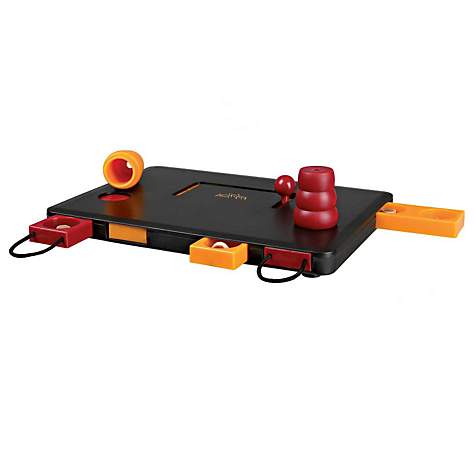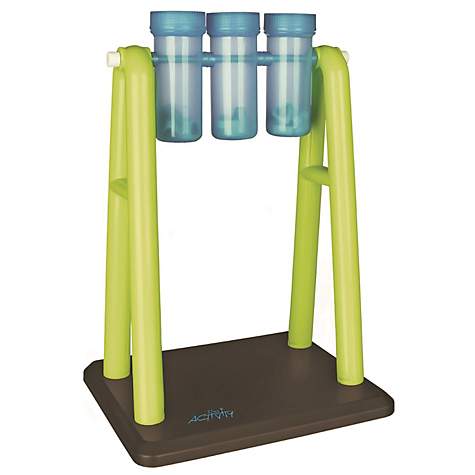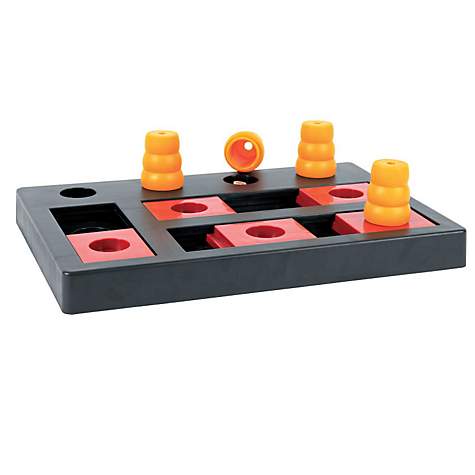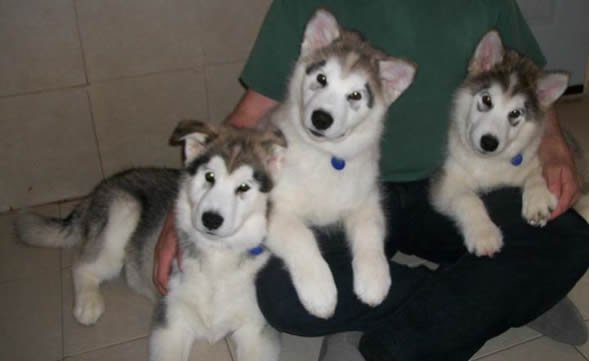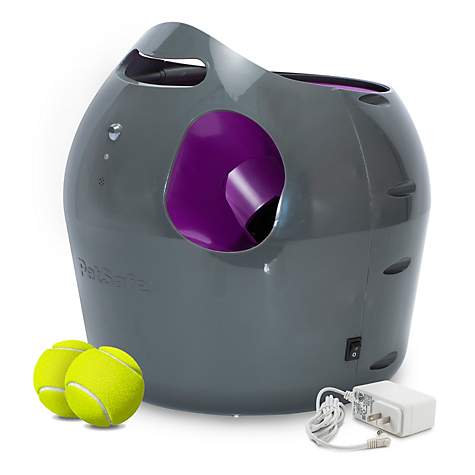Puppy Phases of Development
So, what does this mean??? It means when you get your puppy at 8-9-10 weeks he is ready to bond to your family. He is also an infant! (comparable to an 6-8 month old human baby). Are you ready? There are some things you should do before the puppy arrives such as selecting a veterinarian, puppy-proofing your house, and have a plan and the equipment for sleeping, playing, feeding, and elimination. He will need a variety of safe toys, access to food and water, and other "bare necessities". He'll need a safe, comfortable resting area - young puppies sleep allot! When you bring the puppy home, you will have to arrange YOUR schedule to meet his needs, but as he matures, he can gradually adjust to yours. One of the best things you can do for a Malamute puppy is get him a crate. Now he is yours and is ready to learn!
Malamute Puppy Development
Age |
Needs |
Mental Capacity |
Trainability |
Comments |
| 1-3 weeks | warmth, mom, food, sleep, touch from mother | smell, touch only | none | handling by humans is important, but not as important as mom - eyes open in 10-14 days, ears open shortly after |
| 3th week | warmth, food, sleep, mother, touch, begins weaning | senses function, some awareness of other puppies and some humans | none | A critical period, introduction of humans and other pack members, can see and hear, rudimentary socialization starts by exposure to various noises, people, gentle children and animals |
| 4th week | attempts at mobility, when chilled will sleep in a pile or by mother, will attempt to imitate mom to drink water and eat | awareness of other puppies, some primitive ranking and vocalization, movement is sporadic and uncoordinated | barely | A general awareness of the rest of the world. A good time to introduce more household noises, begins to find a place in the pecking order, learns to compete with littermates - with Malamutes lots of growling and attempts to even "stand" over littermates instinctively goes on. . |
| 5th week | mobility better, escapes from a low whelping box, exploration begins, eating soft solid food | response to vocalization, some ability to recognize individual humans | developing awareness, trying to keep sleeping area clean now that they are mobile | first awareness of the difference between humans and dogs, gentle corrections by breeder/owner may be necessary if play begins to get too rough. Beginning to notice the rest of the world. Will react with emotion and interest when presented with new smells, views, surfaces. Enjoy meeting closely supervised adult dogs in household. |
| 6th week | excellent mobility, usually completely weaned, either voluntarily or with mom's insistence | beginning to play, very mobile, return to mom for comfort and rest often | very imprintable but sensitive, mom stops cleaning up after pups | Exposure to new experiences, emerging personalities. Curious and energetic. Sleep much of the time however. |
| 7th week | beginning to be aware of other dogs in the pack, learning manners and respect for adult dogs and people | supervised play and exploration, discipline by mom and pack members | learning to respect authority, can play simple games, very watchful (but not respectful) of adult dogs in household | Personality develops further, good time to expose to more situations, noises, safe environments. Building confidence and have established a rudimentary pecking order in the puppy pack with respect for adult dogs and humans |
| 8th week | continued human and dog socialization, play with children (supervised) | development of confidence, electrical brain activity is recordable, able to bond with humans | able to respect authority, learn simple behavior such as come, no, sit - housebreaking and leash training can begin, learning manners from adult dogs | First apparent stubbornness in some pups (especially with leash training). Personality reliable and more predictable, conformation easier to determine. |
| 9th week | able to be removed from mother, need new mother or authority figure for security | responsive to gentle human reinforcement | learning by association, very impressionable and willing to bond to a new family | Continue building confidence, continue correcting improper behavior, establish humans as authority figures and "alpha" |
| 10th - 13th week | love, attention, discipline, socialization, security, if still with other puppies dominance issues become more intense with each other | capable of learning through experience, attempts to become dominant and will test other beings dominance, still very influenced | ready for formal teaching, simple sit, down with treats, develop positive attitude toward training and socialization | Work on leash training and attention to humans and particularly the trainer (have puppy follow you around). Reward good behavior with play and treats. Be aware there are a couple of "fear periods" though puppyhood where he may be "spooked" by just about anything unusual. This is normal - treat it matter-of-factly and encourage him to face his fear. He will get over it. Don't baby him. |
| 14th - 16th week | love, attention, training, socialization, security | needs guidance and correction, positive reinforcement and play | high - begin puppy kindergarten classes, socialization to other puppies, may begin to act dominant toward some puppies | Allow socialization to many different breeds. Be watchful of any aggression toward other puppies and remove them/him if necessary. Reward good behavior, continue teaching house manners and basic obedience skills (sit, down, walking on leash, etc.) |
| Up until 6-8 months | love, attention, training, socialization, security, to know other friendly dogs | by 8 months some mals may challenge authority and push limits, try to guard food/toys, may growl or play bite | be firm, be consistent and let him get away with NOTHING. Don't allow anything you wouldn't want a full grown dog doing. Don't allow things "just this one time" - especially right now. | You are forming the relationship you will have with him for the rest of his life - make it a good one. He must respect you and trust that you'll ll be firm and fair and keep him safe from himself or other dogs. Potty training is more consistent now, but there will still be accidents. |
| 8 months- 1 year | love, etc., kind discipline, consistency - a routine, a need to know his place in the pack | an easier time, once he/she stops testing and has been corrected properly, loves to meet new people, pack issues | Correct consistently and properly, keep him busy and you should have few problems. Work on the remaining few areas where he continues to need remedial work. | An important time - get it right. In unneutered males you may have an attempt at marking in the house as he works out his territory. Correct consistently and he'll get it. If he EVER growls or snaps at you or family members, be tough on him. This should never be allowed for ANY reason. Also, he is working out his place in the pack with other family members and pets. |
| 1-2 years | Enjoy adventure. May begin to hunt small animals in the yard - needs a sense of accomplishment. Need for mental stimulation, a challenge, to learn, your guidance. | May become pushy with old or weak pack members in an attempt to "move up". Now is a good time to buy puzzle toys and balls to play with, teach him tricks, work on more advanced obedience exercises. For many mals their personality becomes very "intense" and focused. Many enjoy meeting your people friends at this age. | A good time to take a second obedience class, try a simple sport (nothing too hard on young bones) and keep him busy and active. He'll go through a second "terrible 2's" soon so enjoy the temporary peace. Keep his mind stimulated with lots of toys, outings, training, and any doggy friends he has known since babyhood. Potty training should be reliable by now! | At this age he may suddenly challenge dogs he has grown up with - making his bid for a better role in the pack or a higher rank among friends. Do not allow "puffing up" or aggression of any kind - distract, and keep his attention on you if he does this. He may not do it with all dogs - perhaps only with same-sex dogs. It is still important he has "doggy friends" but he will become more selective about who he wants to associate with! He will likely have a short period of "getting into trouble" and forgetting everything he has been so good about for the past year. This will pass. When it does, he will settle down to the dog he will be for the rest of his life. |
| 3 years and up | Consistency, a routine, a family that loves him, predictability - but fun too! | A routine, attention, and something to keep his mind and body active, to be content and secure in his home knowing he's loved. | Time to invest in a supply of rawhides and take long walks. On walks or other activities he will be more reliable and enjoy sniffing where other dogs have been, marking territory, and can even be good at just hanging out. | Congratulations! He has reached maturity (or some semblence of it). Some mals have that dignity, but some are still clowns - all have found their place in your pack by now (I hope it's with the people on top!). All he needs now is knowing you care for him and regular exercise to stay fit. Cut back on the treats, many mals tend to start gaining too much weight as they mature if not very active. |
Create the right environment: He learns fast and furiously those first few months - let it be good things that he learns. By controlling his environment and not allowing him to be "bad" you will be teaching him your rules and how to be good. Also, a puppy that learns young also learns HOW to LEARN - very important for anything you hope to teach him later in life. The most important issue with young Malamutes however, is learning how to be part of the pack. A Malamute puppy will feel more secure knowing the rules, having them enforced consistently (and kindly) and will want to please an owner he respects. He will learn from other pets you have as well, particularly if they are willing to teach him. And socialize, socialize, socialize!

The Complete Dog Obedience Training Course To A Fantastic Life With Your Dog.

Dog Training For Humans - How to Find Your Dogs Kryptonite. Discover how you can find out what your dog LOVES so you can use it to play and control him off lead.

Ian Dunbar's Sirius Dog Training Academy Course - 4 days Learn how to run and promote your own dog-friendly dog training business.



